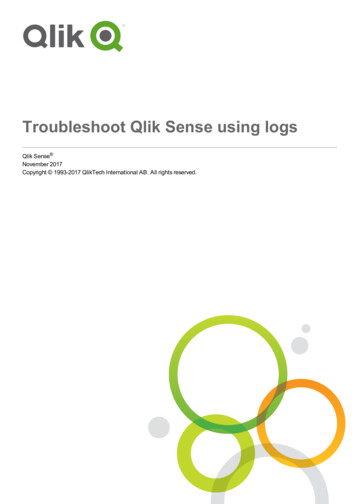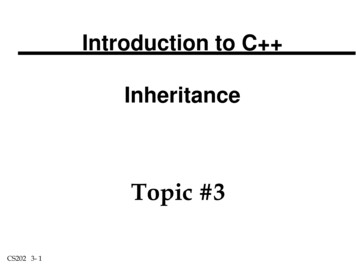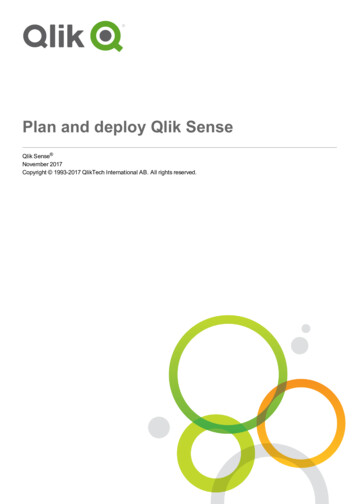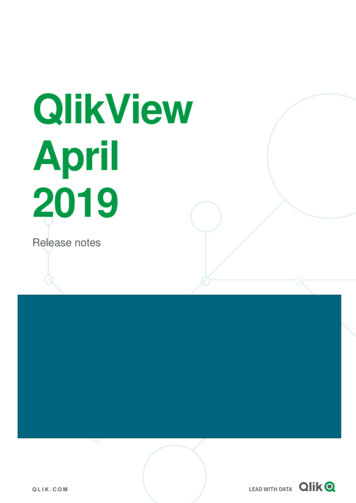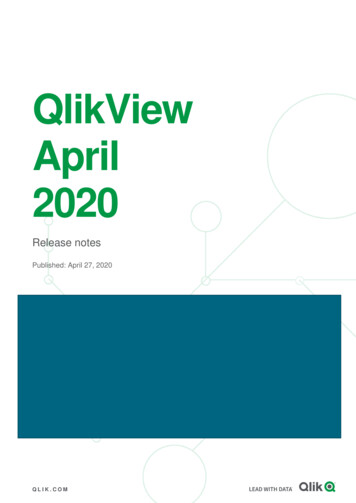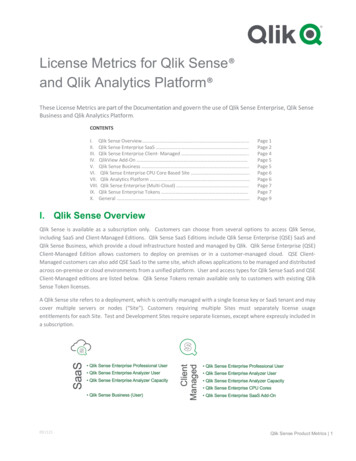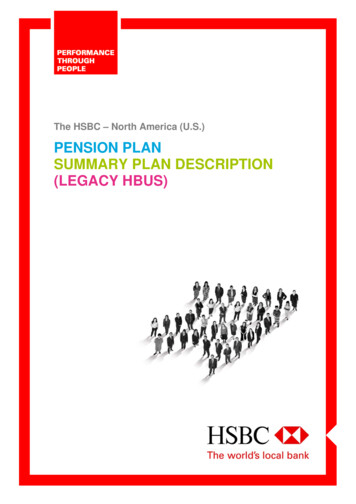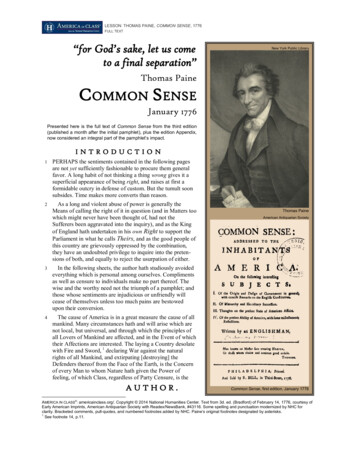
Transcription
LESSON: THOMAS PAINE, COMMON SENSE, 1776FULL TEXT“for God’s sake, let us cometo a final separation”New York Public LibraryThomas PaineCOMMON SENSE*January 1776Presented here is the full text of Common Sense from the third edition(published a month after the initial pamphlet), plus the edition Appendix,now considered an integral part of the pamphlet’s impact.INTRODUCTION1PERHAPS the sentiments contained in the following pagesare not yet sufficiently fashionable to procure them generalfavor. A long habit of not thinking a thing wrong gives it asuperficial appearance of being right, and raises at first aformidable outcry in defense of custom. But the tumult soonsubsides. Time makes more converts than reason.2As a long and violent abuse of power is generally theMeans of calling the right of it in question (and in Matters toowhich might never have been thought of, had not theSufferers been aggravated into the inquiry), and as the Kingof England hath undertaken in his own Right to support theParliament in what he calls Theirs, and as the good people ofthis country are grievously oppressed by the combination,they have an undoubted privilege to inquire into the pretensions of both, and equally to reject the usurpation of either.3In the following sheets, the author hath studiously avoidedeverything which is personal among ourselves. Complimentsas well as censure to individuals make no part thereof. Thewise and the worthy need not the triumph of a pamphlet; andthose whose sentiments are injudicious or unfriendly willcease of themselves unless too much pains are bestowedupon their conversion.4The cause of America is in a great measure the cause of allmankind. Many circumstances hath and will arise which arenot local, but universal, and through which the principles ofall Lovers of Mankind are affected, and in the Event of whichtheir Affections are interested. The laying a Country desolatewith Fire and Sword, 1 declaring War against the naturalrights of all Mankind, and extirpating [destroying] theDefenders thereof from the Face of the Earth, is the Concernof every Man to whom Nature hath given the Power offeeling, of which Class, regardless of Party Censure, is theAUTHOR.Thomas PaineAmerican Antiquarian SocietyCommon Sense, first edition, January 1776AMERICA IN CLASS : americainclass.org/. Copyright 2014 National Humanities Center. Text from 3d. ed. (Bradford) of February 14, 1776, courtesy ofEarly American Imprints, American Antiquarian Society with Readex/NewsBank, #43116. Some spelling and punctuation modernized by NHC forclarity. Bracketed comments, pull-quotes, and numbered footnotes added by NHC. Paine’s original footnotes designated by asterisks.1See footnote 14, p.11.
COMMON SENSEI. OF THE ORIGIN AND DESIGN OF GOVERNMENT IN GENERAL,WITH CONCISE REMARKS ON THE ENGLISH ONSTITUTION.5SOME writers have so confounded society with government as to leave little or no distinctionbetween them; whereas they are not only different but have different origins. Society is producedby our wants, and government by our wickedness; the former promotes our happiness positively byuniting our affections, the latter negatively by restraining our vices. The one encourages [social]intercourse, the other creates distinctions. The first is a patron, the last a punisher.6Society in every state is a blessing, butCOMMON TERMS in COMMON SENSEgovernment, even in its best state, is but anecessary evil; in its worst state an intolerablecharter constitutioncheck limit, keep under certain controlsone: for when we suffer, or are exposed to theposterityfuture generations; our childrensame miseries by a government, which we mightsuffer permit, allowexpect in a country without government, ourviz. that is, namelycalamity is heightened by reflecting that wewant lack, needfurnish the means by which we suffer.Government, like dress, is the badge of lostthe Continent the thirteen coloniesinnocence; the palaces of kings are built upon theforeign courts other monarchs and their advisersrepublican of a republic/representativeruins of the bowers of paradise. For were thedemocracy (not a political party)impulses of conscience clear, uniform andTories; Whigs Loyalists; Patriotsirresistibly obeyed, man would need no otherlawgiver; but that not being the case, he finds itnecessary to surrender up a part of his property to furnish means for the protection of the rest; andthis he is induced to do by the same prudence which in every other case advises him, out of twoevils, to choose the least. Wherefore, security being the true design and end of government, itunanswerably follows that whatever form thereof appears most likely to ensure it to us, with theleast expense and greatest benefit, is preferable to all others.7In order to gain a clear and just idea of the design and end of government, let us suppose a smallnumber of persons settled in some sequestered part of the earth, unconnected with the rest; they willthen represent the first peopling of any country, or of the world. In this state of natural liberty,society will be their first thought. A thousand motives will excite them thereto; the strength of oneman is so unequal to his wants, and his mind so unfitted for perpetual solitude, that he is soonobliged to seek assistance and relief of another, who in his turn requires the same. Four or fiveunited would be able to raise a tolerable dwelling in the midst of a wilderness, but one man mightlabor out the common period of life without accomplishing anything. When he had felled his timberhe could not remove it, nor erect it after it was removed. Hunger in the meantime would urge himfrom his work, and every different want call him a different way. Disease, nay even misfortune,would be death; for though neither might be mortal, yet either would disable him from living, andreduce him to a state in which he might rather be said to perish than to die.8Thus necessity, like a gravitating power, would soon form our newly arrived emigrants intosociety, the reciprocal blessings of which would supersede, and render the obligations of law andgovernment unnecessary while they remained perfectly just to each other; but as nothing but heavenis impregnable to vice, it will unavoidably happen that in proportion as they surmount the firstdifficulties of emigration, which bound them together in a common cause, they will begin to relaxin their duty and attachment to each other: and this remissness will point out the necessity ofestablishing some form of government to supply the defect of moral virtue.National Humanities Center Thomas Paine, Common Sense, 1776, 3d ed., full text incl. Appendix2
9Some convenient tree will afford them a State House [legislative building], under the branches ofwhich the whole colony may assemble to deliberate on public matters. It is more than probable thattheir first laws will have the title only of REGULATIONS, and be enforced by no other penalty thanpublic disesteem. In this first parliament every man, by natural right, will have a seat.10But as the colony increases, the public concerns will increase likewise, and the distance at whichthe members may be separated will render it too inconvenient for all of them to meet on everyoccasion as at first, when their number was small, their habitations near, and the public concernsfew and trifling. This will point out the convenience of their consenting to leave the legislative partto be managed by a select number chosen from the whole body, who are supposed to have the sameconcerns at stake which those have who appointed them, and who will act in the same manner asthe whole body would act were they present. If the colony continue increasing, it will becomenecessary to augment the number of the representatives, and that the interest of every part of thecolony may be attended to, it will be found best to divide the whole into convenient parts, each partsending its proper number: and that the elected might never form to themselves an interest separatefrom the electors, prudence will point out the propriety of having elections often: because as theelected might by that means return and mix again with the general body of the electors in a fewmonths, their fidelity to the public will be secured by the prudent reflection of not making a rod forthemselves. And as this frequent interchange will establish a common interest with every part of thecommunity, they will mutually and naturally support each other, and on this (not on the unmeaningname of king) depends the strength of government, and the happiness of the governed.11Here then is the origin and rise of government; namely, a mode rendered necessary by theinability of moral virtue to govern the world. Here too is the design and end of government, viz.[namely/that is] freedom and security. And however our eyes may be dazzled with show, or ourears deceived by sound, however prejudice may warp our wills or interest darken our understanding, the simple voice of nature and reason will say, it is right.12I draw my idea of the form of government from a principle in nature which no art can overturn,viz. that the more simple anything is, the less liable it is to be disordered, and the easier repairedwhen disordered; and with this maxim in view, I offer a few remarks on the so much boastedconstitution of England. That it was noble for the dark and slavish times in which it was erected, isgranted. When the world was overrun with tyranny, the least remove therefrom was a gloriousrescue. But that it is imperfect, subject to convulsions, and incapable of producing what it seems topromise, is easily demonstrated.Absolute governments (tho’ the disgrace of human nature) have this advantage with them, thatthey are simple. If the people suffer, they know the head from which their suffering springs, knowlikewise the remedy, and are not bewildered by a variety of causes and cures. But the constitutionof England is so exceedingly complex that the nation may suffer for years together without beingable to discover in which part the fault lies; some will say in one and some in another, and everypolitical physician will advise a different medicine.1314I know it is difficult to get over local or longstanding prejudices, yet if we will suffer [permit/allow] ourselves to examine the component parts of the English constitution, we shall find them tobe the base remains of two ancient tyrannies, compounded with some new republican materials.15First.—The remains of monarchical tyrannyin the person of the king.16Secondly.—The remains of aristocraticaltyranny in the persons of the peers.17Thirdly.—The new republican materials, inthe persons of the commons, on whose virtuedepends the freedom of England.the king: the monarch, hereditary rulerthe peers: the aristocracy, nobles (lords, barons,etc.), represented in the House of Lordsthe commons the common people, represented in theHouse of CommonsNational Humanities Center Thomas Paine, Common Sense, 1776, 3d ed., full text incl. Appendix3
18The two first, by being hereditary, are independent of the people; wherefore in a constitutionalsense they contribute nothing towards the freedom of the state.19To say that the constitution of England is a union of three powers, reciprocally checking eachother, is farcical. Either the words have no meaning, or they are flat contradictions.202To say that the commons is a check upon the king, presupposes two things.21First.—That the king is not to be trusted without being looked after, or in other words, that athirst for absolute power is the natural disease of monarchy.22Secondly.—That the commons, by being appointed for that purpose,are either wiser or more worthy of confidence than the crown.23But as the same constitution which gives the commons a power tocheck the king by withholding the supplies, gives afterwards the kinga power to check the commons, by empowering him to reject theirother bills. It again supposes that the king is wiser than those whom ithas already supposed to be wiser than him. A mere absurdity!24There is something exceedingly ridiculous in the composition ofmonarchy. It first excludes a man from the means of information, yet empowers him to act in caseswhere the highest judgment is required. The state of a king shuts him from the world, yet thebusiness of a king requires him to know it thoroughly; wherefore the different parts, by unnaturallyopposing and destroying each other, prove the whole character to be absurd and useless.25Some writers have explained the English constitution thus: the king, say they, is one, the peopleanother. The peers are a house in behalf of the king, the commons in behalf of the people; but thishath all the distinctions of a house divided against itself; and though the expressions be pleasantlyarranged, yet when examined they appear idle and ambiguous; and it will always happen that thenicest construction that words are capable of, when applied to the description of something whicheither cannot exist, or is too incomprehensible to be within the compass of description, will bewords of sound only, and though they may amuse the ear, they cannot inform the mind, for thisexplanation includes a previous question, viz. How came the king by a power which the people areafraid to trust, and always obliged to check? Such a power could not be the gift of a wise people,neither can any power which needs checking be from God; yet the provision which the constitutionmakes supposes such a power to exist.26But the provision is unequal to the task. The means either cannot or will not accomplish the end,and the whole affair is a felo de se:2 for as the greater weight will always carry up the less, and asall the wheels of a machine are put in motion by one, it only remains to know which power in theconstitution has the most weight, for that will govern: and though the others, or a part of them, mayclog, or, as the phrase is, check the rapidity of its motion, yet so long as they cannot stop it, theirendeavors will be ineffectual: the first moving power will at last have its way, and what it wants inspeed is supplied by time.27That the crown is this overbearing part in the English constitution needs not be mentioned, andthat it derives its whole consequence merely from being the giver of places and pensions is selfevident; wherefore, though we have been wise enough to shut and lock a door against absolutemonarchy, we at the same time have been foolish enough to put the crown in possession of the key.28The prejudice of Englishmen in favor of their own government by king, lords, and commons,arises as much or more from national pride than reason. Individuals are undoubtedly safer inEngland than in some other countries, but the will of the king is as much the law of the land inBritain as in France, with this difference, that instead of proceeding directly from his mouth, it is“It again supposesthat the king is wiserthan those whom ithas already supposedto be wiser than him.A mere absurdity!”Felo de se: an act of deliberate self-destruction; suicide (medieval Latin).National Humanities Center Thomas Paine, Common Sense, 1776, 3d ed., full text incl. Appendix4
handed to the people under the more formidable shape of an act of Parliament. For the fate ofCharles the First hath only made kings more subtle—not more just.329Wherefore, laying aside all national pride and prejudice in favor of modes and forms, the plaintruth is that it is wholly owing to the constitution of the people, and not to the constitution of thegovernment that the crown is not as oppressive in England as in Turkey.30An inquiry into the constitutional errors in the English form of government is at this time highlynecessary, for as we are never in a proper condition of doing justice to others while we continueunder the influence of some leading partiality, so neither are we capable of doing it to ourselveswhile we remain fettered by any obstinate prejudice. And as a man who is attached to a prostitute isunfitted to choose or judge of a wife, so any prepossession in favor of a rotten constitution ofgovernment will disable us from discerning a good one.II. OF MONARCHY AND HEREDITARY SUCCESSION.331MANKIND being originally equal in the order of creation, the equality could only be destroyed bysome subsequent circumstance. The distinctions of rich and poor may in a great measure beaccounted for, and that without having recourse to the harsh ill-sounding names of oppression andavarice. Oppression is often the consequence, but seldom or never the means of riches; and thoughavarice will preserve a man from being necessitously poor, it generally makes him too timorous tobe wealthy.32But there is another and greater distinction for which no truly natural or religious reason can beassigned, and that is the distinction of men into KINGS and SUBJECTS. Male and female are thedistinctions of nature, good and bad the distinctions of heaven; but how a race of men came into theworld so exalted above the rest, and distinguished like some new species, is worth inquiring into,and whether they are the means of happiness or of misery to mankind.33In the early ages of the world, according to the scripture chronology there were no kings, theconsequence of which was there were no wars. It is the pride of kings which throws mankind intoconfusion. Holland without a king hath enjoyed more peace for this last century than any of themonarchical governments in Europe. Antiquity favors the same remark, for the quiet and rural livesof the first patriarchs hath a happy something in them, which vanishes when we come to the historyof Jewish royalty.34Government by kings was first introduced into the world by the Heathens, from whom thechildren of Israel copied the custom. It was the most prosperous invention the Devil ever set on footfor the promotion of idolatry. The Heathens paid divine honors to their deceased kings, and theChristian world hath improved on the plan by doing the same to their living ones. How impious isthe title of sacred majesty applied to a worm, who in the midst of his splendor is crumbling intodust!35As the exalting one man so greatly above the rest cannot be justified on the equal rights of nature,so neither can it be defended on the authority of scripture; for the will of the Almighty as declaredby Gideon and the prophet Samuel expressly disapproves of government by kings. All anti-monarchical parts of scripture have been very smoothly glossed over in monarchical governments, butthey undoubtedly merit the attention of countries which have their governments yet to form.“Render unto Caesar the things which are Caesar’s” is the scripture doctrine of courts, yet it is nosupport of monarchical government, for the Jews at that time were without a king, and in a state ofvassalage to the Romans.36Near three thousand years passed away from the Mosaic [of Moses] account of the creation tillthe Jews under a national delusion requested a king. Till then their form of government (except inCharles I was beheaded in 1649 during the English civil wars after the victory of Oliver Cromwell.National Humanities Center Thomas Paine, Common Sense, 1776, 3d ed., full text incl. Appendix5
extraordinary cases where the Almighty interposed) was a kind of republic administered by a judgeand the elders of the tribes. Kings they had none, and it was held sinful to acknowledge any beingunder that title but the Lord of Hosts. And when a man seriously reflects on the idolatrous homagewhich is paid to the persons of Kings, he need not wonder that the Almighty, ever jealous of hishonor, should disapprove of a form of government which so impiously invades the prerogative ofheaven.4537Monarchy is ranked in scripture as one of the sins of the Jews, for which a curse in reserve isdenounced against them. The history of that transaction is worth attending to.38The children of Israel being oppressed by the Midianites, Gideon marched against them with asmall army, and victory thro’ the divine interposition decided in his favor. The Jews, elate withsuccess, and attributing it to the generalship of Gideon, proposed making him a king, saying, Rulethou over us, thou and thy son and thy son’s son. Here was temptation in its fullest extent; not akingdom only, but a hereditary one, but Gideon in the piety of his soul replied, I will not rule overyou, neither shall my son rule over you. THE LORD SHALL RULE OVER YOU. Words need not bemore explicit; Gideon doth not decline the honor but denieth their right to give it; neither doth hecompliment them with invented declarations of his thanks, but in the positive style of a prophetcharges them with disaffection to their proper Sovereign, the King of heaven.39About one hundred and thirty years after this, they fell again into the same error. The hankeringwhich the Jews had for the idolatrous customs of the Heathens is something exceedinglyunaccountable; but so it was, that laying hold of the misconduct of Samuel’s two sons who wereentrusted with some secular concerns, they came in an abrupt and clamorous manner to Samuel,saying, Behold thou art old, and thy sons walk not in thy ways, now make us a king to judge us likeall the other nations.4 And here we cannot but observe that their motives were bad, viz. that theymight be like unto other nations, i.e., the Heathens, whereas their true glory lay in being as muchunlike them as possible. But the thing displeased Samuel when they said, Give us a King to judgeus; and Samuel prayed unto the Lord, and the Lord said unto Samuel, Hearken unto the voice of thepeople in all that they say unto thee, for they have not rejected thee, but they have rejected me,THAT I SHOULD NOT REIGN OVER THEM. According to all the works which they have done since theday that I brought them up out of Egypt, even unto this day, wherewith they have forsaken me, andserved other Gods: so do they also unto thee. Now therefore hearken unto their voice, howbeit,protest solemnly unto them and show them the manner of the king that shall reign over them, i.e.,not of any particular king, but the general manner of the kings of the earth, whom Israel was soeagerly copying after. And notwithstanding the great distance of time and difference of manners,the character is still in fashion. And Samuel told all the words of the Lord unto the people, thatasked of him a king. And he said, This shall be the manner of the king that shall reign over you: hewill take your sons and appoint them for himself for his chariots and to be his horsemen, and someshall run before his chariots (this description agrees with the present mode of impressing men5) andhe will appoint him captains over thousands and captains over fifties, will set them to ear hisground and to reap his harvest, and to make his instruments of war and instruments of his chariots.And he will take your daughters to be confectionaries and to be cooks and to be bakers (thisdescribes the expense and luxury as well as the oppression of kings) and he will take your fieldsand your olive yards, even the best of them, and give them to his servants. And he will take the tenthof your seed, and of your vineyards, and give them to his officers and to his servants (by which wesee that bribery, corruption, and favoritism are the standing vices of kings) and he will take thetenth of your men servants, and your maid servants, and your goodliest young men, and your asses,and put them to his work: and he will take the tenth of your sheep, and ye shall be his servants, andye shall cry out in that day because of your king which ye shall have chosen, AND THE LORD WILLNOT HEAR YOU IN THAT DAY.” This accounts for the continuation of monarchy; neither do theSee footnotes 6-7, p. 7.Impressing men: forcibly taking sailors from enemies’ ships to serve on the nation’s own ships.National Humanities Center Thomas Paine, Common Sense, 1776, 3d ed., full text incl. Appendix6
characters of the few good kings which have lived since either sanctify the title or blot out thesinfulness of the origin; the high encomium given of David takes no notice of him officially as aking, but only as a man after God’s own heart. Nevertheless the People refused to obey the voice ofSamuel, and they said, Nay but we will have a king over us, that we may be like all the nations, andthat our king may judge us, and go out before us and fight our battles.6 Samuel continued to reasonwith them but to no purpose; he set before them their ingratitude, but all would not avail; and seeingthem fully bent on their folly, he cried out, I will call unto the Lord, and he shall send thunder andrain (which was then a punishment, being in the time of wheat harvest) that ye may perceive andsee that your wickedness is great which ye have done in the sight of the Lord, IN ASKING YOU AKING. So Samuel called unto the Lord, and the Lord sent thunder and rain that day, and all thepeople greatly feared the Lord and Samuel. And all the people said unto Samuel, Pray for thyservants unto the Lord thy God that we die not, for WE HAVE ADDED UNTO OUR SINS THIS EVIL,7TO ASK A KING. These portions of scripture are direct and positive. They admit of no equivocalconstruction. That the Almighty hath here entered his protest against monarchical government istrue, or the scripture is false. And a man hath good reason to believe that there is as much of kingcraft as priest-craft in withholding the scripture from the public in Popish [Roman Catholic]countries. For monarchy in every instance is the Popery of government.6740To the evil of monarchy we have added that of hereditary succession; and as the first is adegradation and lessening of ourselves, so the second, claimed as a matter of right, is an insult andimposition on posterity [future generations/our children]. For all men being originally equals, noone by birth could have a right to set up his own family in perpetual preference to all others forever,and though himself might deserve some decent degree of honors of his contemporaries, yet hisdescendants might be far too unworthy to inherit them. One of the strongest natural proofs of thefolly of hereditary right in kings is that nature disapproves it, otherwise she would not so frequentlyturn it into ridicule by giving mankind an ass for a lion.41Secondly, as no man at first could possess any other public honors than were bestowed upon him,so the givers of those honors could have no power to give away the right of posterity, and thoughthey might say “We choose you for our head,” they could not, without manifest injustice to theirchildren, say “that your children and your children’s children shall reign over ours forever. Becausesuch an unwise, unjust, unnatural compact might (perhaps) in the next succession put them underthe government of a rogue or a fool. Most wise men in their private sentiments have ever treatedhereditary right with contempt; yet it is one of those evils which, when once established, is noteasily removed. Many submit from fear, others from superstition, and the more powerful part shareswith the king the plunder of the rest.42This is supposing the present race of kings in the world to have had an honorable origin; whereas itis more than probable, that could we take off the dark covering of antiquity and trace them to theirfirst rise, that we should find the first of them nothing“nothing better than the principalbetter than the principal ruffian of some restless gang,whose savage manners or pre-eminence in subtletyruffian of some restless gang”obtained him the title of chief among plunderers; andwho, by increasing in power and extending his depredations, overawed the quiet and defenseless topurchase their safety by frequent contributions. Yet his electors could have no idea of givinghereditary right to his descendants, because such a perpetual exclusion of themselves wasincompatible with the free and unrestrained principles they professed to live by. Wherefore hereditarysuccession in the early ages of monarchy could not take place as a matter of claim, but as somethingcasual or complemental; but as few or no records were extant in those days, and traditionary historystuffed with fables, it was very easy, after the lapse of a few generations, to trump up somesuperstitious tale conveniently timed, Mahomet-like, to cram hereditary right down the throats of the1 Samuel 8: 6-20.1 Samuel 12:18.National Humanities Center Thomas Paine, Common Sense, 1776, 3d ed., full text incl. Appendix7
vulgar. Perhaps the disorders which threatened, or seemed to threaten, on the decease of a leader andthe choice of a new one (for elections among ruffians could not be very orderly) induced many at firstto favor hereditary pretensions; by which means it happened, as it hath happened since, that what atfirst was submitted to as a convenience was afterwards claimed as a right.843England since the conquest [Norman Conquest of“A French bastard landing1066] hath known some few good monarchs, but groanedwith an armed banditti andbeneath a much larger number of bad ones: yet no man inhis senses can say that their claim under William theestablishing himself king ofConqueror is a very honorable one. A French bastardEngland against the consent oflanding with an armed banditti and establishing himselfthe natives, is, in plain terms, aking of England against the consent of the natives is, invery paltry rascally original.”plain terms, a very paltry rascally original.—It certainlyhath no divinity in it. However it is needless to spendmuch time in exposing the folly of hereditary right; if there are any so weak as to believe it, letthem promiscuously worship the ass and the lion, and welcome. I shall neither copy their humility,nor disturb their devotion.44Yet I should be glad to ask how they suppose kings came at first. The question admits but of threeanswers, viz. either by lot, by election, or by usurpation [forcible overthrow]. If the first king wastaken by lo
National Humanities Center Thomas Paine, Common Sense, 1776, 3d ed., full text incl. Appendix 4 18 The two first, by being hereditary, are independent of the people; wherefore in a constitutional sense they contribute nothing towards the freedom of the state. 19 To say that the constitution of Engla

